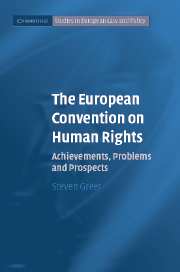7 - Conclusion
Published online by Cambridge University Press: 13 July 2009
Summary
ACHIEVEMENTS AND PROBLEMS
In order to discover whether the European Convention on Human Rights has achieved anything more substantial than mere bureaucratic institutionalization in Strasbourg, the question of what it is for must be squarely addressed. The apparently obvious answer, and the one which underpins the approach of most jurists, maintains that, whatever it was intended to achieve over fifty years ago, its current primary purpose is to enable individuals to bring governments of member states before an international court for violations of their basic human rights – the model of ‘individual justice’. Most who take this view would also add that the Convention has discharged this function very effectively, or at least that it has done so significantly more effectively than any comparable trans-national process in the world.
There are, however, several problems with this account of the system's rationale and this assessment of its success. The first is that although for some of its founding fathers the delivery of individual justice should have been a priority, this was not one of the Convention's original agreed objectives. As with many public institutions and official texts, the structure and content of the Convention were the result of compromise between competing visions. It emerged from the negotiations of the late 1940s primarily intended to contribute to the prevention of another war between western European states, to provide a statement of common values contrasting sharply with Soviet-style communism, to re-enforce a sense of common identity and purpose should the Cold War turn ‘hot’, and to establish an early warning device by which a drift towards authoritarianism in any member state could be detected and dealt with by complaints to an independent trans-national judicial tribunal.
- Type
- Chapter
- Information
- The European Convention on Human RightsAchievements, Problems and Prospects, pp. 316 - 326Publisher: Cambridge University PressPrint publication year: 2006
- 1
- Cited by



